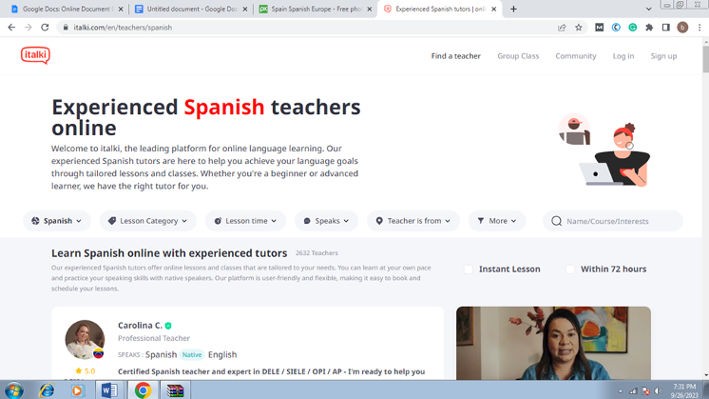Christmas is a time when food takes center stage all over the world, and Spain is no exception. With many traditional Spanish dishes and sweet treats available only at Christmas, Spanish Christmas food is the ideal excuse to gather families around the table.
From the main Spanish Christmas dinner on Christmas Eve (24th December) to the Reyes Magos (Three Kings) arrival on January 6th, families gather in Spain to enjoy traditional Spanish meals full of meat, seafood, and no shortage of sweet treats.

Some of these are popular festive foods throughout Spain, while others are unique to specific regions of the country. If you are in Spain or simply want to enjoy Christmas with a twist in 2023, try these Spanish Christmas food dishes and celebrate like a true Spaniard. And if you are about to visit Spain, mastering Spanish phrases for travel will make your trip easier and memorable at the same time.
Famous Spanish Christmas food
1. Entremeses
Anyone who is aware of Spanish food culture knows how much Spaniards adore cured meats or charcuterie such as gammon, chorizo, or morcilla (black pudding), and Christmas is no exception.
Entremeses, which are at the heart of Spanish Christmas cuisine, are essentially plates of cured meat served at the start of a Christmas dinner. Consider it an appetizer that, in addition to the best Spanish “jamón,” will most likely include a selection of local cheese.
2. Suckling pig
Cochinillo (suckling pig) is a traditional Christmas dish in Spain’s Castile and Leon region, often taking center stage as part of the Christmas Eve meal, though lamb or even turkey is sometimes preferred.
People from other parts of Spain frequently order their suckling pig months in advance from Segovia or Valladolid, and when the big day arrives, the meat is cooked until the skin is crispy and dark brown. This tender meat is frequently served with potatoes and onions that caramelize beneath the meat as it cooks.

3. Galets
Spanish Christmas food traditions can be found throughout the country, and Galets is a traditional Christmas soup eaten in Catalonia during the holiday season. This hearty winter soup features a meaty broth and large pasta shells called galets, which are sometimes filled with meat.
4. Marzipan
Although it is consumed all year in Toledo (South of Madrid), marzipan has become another symbol of Christmas gastronomy throughout Spain. It was first mentioned in writing in 1577 and is thought to be of Arab origin, though some say it was born in the convent of San Clemente, in the capital of Castile-La Mancha, at the hands of its nuns.
This sugary treat is made from ground almonds, egg yolk, and sugar, and whether you like it or not, you have to admit that it has a place in any Spanish household during the holidays. Besides the taste, marzipan is formed into various shapes that are almost too pretty to eat and make equally lovely Christmas decorations.
5. Seafood
Eating well is very important in Spain all year, and for a special occasion like Christmas, Spaniards go all out. With this in mind, large seafood spreads at Christmas Eve dinners are very common, particularly in coastal regions such as Galicia.
Whether it is a prawn cocktail or a magnificent lobster main course, seafood is bound to appear at some point during most Spanish Christmas Eve.

6. Turrón
This traditional Christmas treat has only four ingredients: honey, sugar, almonds, and egg whites. Despite the fact that there are now dozens of varieties of turrón, which is essentially the Spanish version of nougat, ranging from pistachio to truffle or coconut, the two most popular are still the traditional hard and soft varieties.
7. Roscón de Reyes
The “Roscón de Reyes” is the star of the show, and without him, no Spanish Christmas season is complete. Definitely one of the most well-liked Christmas desserts in Spain, this sweet, bread-like cake is shaped like a giant doughnut and topped with slices of candied fruit.
It would be difficult to locate a home nationwide on January 6th that does not serve roscón for breakfast or as a midday snack in observance of what is known as the Three Kings’ Day in Spain. The only thing left to decide is whether or not to have your roscón with cream during Christmas and New Year’s Eve, a topic of intense discussion that occurs throughout Spain each year.

If someone invites you for Christmas dinner, knowing phrases like thank you in Spanish is necessary. These phrases show your thankfulness and gratitude over the dinner invitation and help you to end that meet-up on a good and positive note.
If you want to develop a command of Spanish, we recommend you book Spanish lessons with italki. The experienced tutors available here will help you develop your language expertise at a gradual pace.
Master Spanish with italki
If you are a beginner who is trying to figure out how to speak Spanish without compromising your daily routine tasks, italki can be the best learning platform for you. This platform has some exceptional features that allow every learner to master his/her desired language in the comfort of their home.
Customized learning sessions: When you have lesson plans that are designed to match the requirements and learning objectives, learning Spanish becomes incredibly simple. You can learn Spanish online through individualized lessons with italki. Your learning objectives and goals will become clearer to you after these sessions.
Skilled Spanish instructors: Most instructors connected to italki are native speakers. Based on your preferred learning schedule and budget preferences, you can choose an online Spanish teacher from the list of qualified and experienced educators, providing detailed Spanish lessons. You will receive personalized lesson plans from each of these teachers that are tailored to your needs.

Find Your Perfect Teacher
At italki, you can find your Spanish tutor from all qualified and experienced teachers. Now experience the excellent language learning journey!
Book a trial lesson
Conversational learning sessions: You will interact with the conversational Spanish tutors on italki to the fullest. The conversational learning approach simultaneously makes learning exciting and enjoyable. You can select the learning format that best suits your goals and objectives.
Flexible learning schedule: Is there anything more enjoyable than studying Spanish at your own pace and convenience? This innovative platform gives you maximum flexibility while understanding people’s hectic schedules.

Process of booking lessons with italki
- Create an italki profile. Fill in the information about your preferred learning style, objectives, and goals.
- Look for Spanish tutors on the italki website. Examine their profiles to find the one that best meets your needs.
- Schedule a trial lesson to evaluate their learning style. You can book a trial lesson at a discounted rate to assess the overall learning experience.
- Establish your objectives for learning Spanish. After you have determined your objectives, create a learning plan with the help of your chosen Spanish tutor. We recommend that you choose a regular session to establish a consistent learning routine.
- Practice Spanish with your teacher. Engage in real-life scenarios to improve your fluency.
- Utilize all of the additional learning resources. The practice exercises, textbooks, and recommended videos are excellent tools for quickly mastering Spanish.
- Consider the tutor’s feedback. Examine your errors and look for ways to improve your speaking and writing.
- Keep track of your progress. It is critical to maintain the motivation needed to learn a second language.
Frequently Asked Questions
Is there a specific Christmas Eve dinner tradition in Spain?
Yes, Christmas Eve is often celebrated in Spain with a festive dinner called “Nochebuena.” It typically includes a variety of seafood, such as shrimp and shellfish, as well as roasted meats.
Are there regional variations in Christmas dishes in Spain?
Yes, Spain has diverse regional cuisines, and Christmas dishes can vary from one region to another. For example, “Canelons” (cannelloni) filled with the leftovers from the Christmas Day feast is a common tradition in Catalonia.
Do Spaniards celebrate with a special Christmas drink?
Yes, “sidra” (cider) and “cava” (Spanish sparkling wine) are popular Christmas drinks in Spain. “Anís” (anise-flavored liqueur) is also commonly enjoyed during the holiday season.
Conclusion
Spanish Christmas food is a delightful and diverse mixture of flavors, reflecting the country’s rich cultural traditions. The festive season in Spain is marked by a series of unique and cherished dishes mentioned throughout the guide, which bring families and communities together.
If you are looking for a private Spanish tutor, explore italki to get the instructor of your choice. Book your trial lesson to analyze the quality of the session. Visit the website today!
Want to learn a language at italki?
Here are the best resources for you!



















